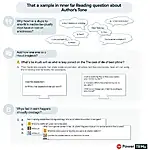The IELTS Speaking test often includes questions about personal experiences, including memorable conversations. This topic is frequently featured in Part 2 of the test, where candidates are asked to speak at length about a specific event or experience. Being prepared to discuss a memorable conversation can significantly boost your confidence and performance in the exam.
Describe a skill you have been practicing recently is another common topic in IELTS Speaking. Similar to describing a memorable conversation, it requires you to reflect on personal experiences and articulate them clearly.
Part 1: Introduction and Interview
In Part 1, the examiner may ask general questions about conversations and communication. Here are some potential questions:
- Do you enjoy having conversations with people?
- What kind of conversations do you find most interesting?
- How often do you have deep conversations with friends or family?
Let’s look at a sample answer for the second question:
Examiner: What kind of conversations do you find most interesting?
Candidate (Band 7-8 response): I find conversations about cultural differences particularly fascinating. When I talk to people from diverse backgrounds, I’m always intrigued by their unique perspectives and experiences. These discussions often broaden my horizons and challenge my preconceptions about the world.
Part 2: Long Turn
For Part 2, you might receive a cue card like this:
Describe a memorable conversation you had recently
You should say:
- Who you had the conversation with
- Where and when the conversation took place
- What the conversation was about
- And explain why the conversation was memorable
Here’s a sample response for Band 8-9:
“I’d like to talk about a thought-provoking conversation I had with my grandfather last month. We were sitting in his cozy living room on a Sunday afternoon, enjoying a cup of tea together.
The conversation revolved around his experiences during World War II. As a veteran, he shared vivid anecdotes about his time serving in the army, shedding light on the harsh realities of war that aren’t often discussed in history books. He spoke about the camaraderie among soldiers, the constant fear they lived with, and the profound impact the war had on his outlook on life.
What made this conversation truly memorable was the raw emotion in my grandfather’s voice as he recounted these stories. It was eye-opening to hear firsthand accounts of historical events I had only read about in textbooks. His words painted a vivid picture of a time I could never fully comprehend, bridging the gap between generations and giving me a deeper appreciation for the sacrifices made by his generation.
Moreover, this conversation was particularly poignant because it was one of the first times my grandfather had opened up about his war experiences. It felt like a rare glimpse into a part of his life he had kept hidden for decades. The trust he placed in me by sharing these personal stories deeply touched me and strengthened our bond.
In essence, this conversation was memorable because it transcended a simple exchange of words. It was a profound learning experience that broadened my perspective on history, family, and the human capacity for resilience in the face of adversity.”
Follow-up questions:
Examiner: How did this conversation change your perspective on history?
Candidate (Band 8-9 response): This conversation fundamentally altered my understanding of historical events. While textbooks provide facts and figures, my grandfather’s personal account brought the era to life in a way no book could. It humanized the statistics and made me realize the profound personal toll of war. This firsthand narrative challenged my preconceptions and encouraged me to seek out more personal stories to complement my academic knowledge of history.
Part 3: Two-way Discussion
Examiner: How do you think technology has changed the way we communicate?
Candidate (Band 6-7 response): Technology has greatly changed communication. We can now talk to people anywhere in the world instantly through video calls and messaging apps. This has made communication faster and more convenient. However, some people argue that it has also made our interactions less personal and meaningful.
Candidate (Band 8-9 response): Technology has revolutionized the landscape of communication, ushering in an era of unprecedented connectivity. On one hand, it has bridged geographical divides, enabling real-time communication across continents through video calls and instant messaging. This has fostered global relationships and facilitated the exchange of ideas on an international scale. However, there’s a flip side to this technological advancement. The ease and brevity of digital communication have, in some cases, eroded the depth of our interactions. We’ve seen a shift towards more superficial exchanges, with emojis and short messages often replacing nuanced, face-to-face conversations. This dichotomy presents both opportunities and challenges as we navigate the evolving nature of human connection in the digital age.
Describe a conversation that made you think differently is another topic that can help you prepare for discussing impactful conversations in your IELTS Speaking test.
Key Vocabulary and Phrases
To elevate your speaking performance, incorporate these sophisticated words and phrases:
-
Thought-provoking /θɔːt prəˈvəʊkɪŋ/ (adjective): Stimulating careful consideration or attention.
Example: “The documentary raised several thought-provoking questions about climate change.” -
Shed light on /ʃed laɪt ɒn/ (phrasal verb): To reveal new information about something.
Example: “The newly discovered documents shed light on the origins of the conflict.” -
Transcend /trænˈsend/ (verb): To go beyond the usual limits of something.
Example: “Great art has the power to transcend cultural and linguistic boundaries.” -
Poignant /ˈpɔɪnjənt/ (adjective): Evoking a keen sense of sadness or regret.
Example: “The film’s ending was particularly poignant, leaving many viewers in tears.” -
Broaden one’s horizons /ˈbrɔːdn wʌnz həˈraɪznz/ (idiom): To expand the range of one’s knowledge, interests, or experiences.
Example: “Traveling to different countries is an excellent way to broaden one’s horizons.”
 Person using technology for global communication
Person using technology for global communication
Examiner’s Advice
To excel in the IELTS Speaking test, particularly when discussing memorable conversations:
-
Practice Storytelling: Develop your ability to narrate events coherently and engagingly. This skill is crucial for Part 2 of the test.
-
Expand Your Vocabulary: Incorporate sophisticated vocabulary and idiomatic expressions relevant to communication and personal experiences.
-
Reflect on Personal Experiences: Regularly think about your conversations and interactions. This reflection will help you respond more naturally and authentically during the test.
-
Work on Fluency: Practice speaking at length without long pauses. Use linking words and phrases to connect your ideas smoothly.
-
Develop Critical Thinking: For Part 3, practice analyzing topics from different angles. This will help you provide more insightful and well-rounded responses.
Remember, the key to success in IELTS Speaking is not just about language proficiency, but also about your ability to communicate ideas clearly and engagingly. Regular practice and self-reflection are essential for improvement.
Describe a time when you visited a friend’s house can be another useful topic to practice, as it involves similar skills in describing personal experiences and interactions.


